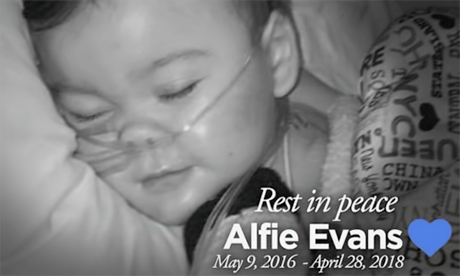Emotions are high; a child is being removed from medical interventions that have been keeping him alive; doctors and staff, the entire U.K. judicial system, are being condemned by pundits and excoriated by social media.
The case has roiled the United Kingdom and the public is taking sides in the streets and across the internet.
Members of “Alfie’s army” have even attempted to storm the hospital where the patient is being treated to liberate him from the hospital’s care.
But is the treatment being offered to Alfie Evans, a toddler suffering from a so-far-undiagnosed neurological disorder, moral, immoral or even medically inappropriate?
Catholic teaching on end-of-life care and treatment for patients in a persistent vegetative state can help address the controversy, says Kevin Wildes, S.J., a bioethicist and president of Loyola University New Orleans.
But while the tradition can help make sense of Alfie’s plight, it cannot fully mitigate the emotional suffering of family members closest to him or even, apparently, put a stop to end-of-life controversies like the one consuming Alfie and his family.
They seem to crop up periodically in the United States and now with an increasing frequency in the United Kingdom.
The months-long legal battle between Alfie’s parents and his doctors at the Alder Hey Children’s Hospital in Liverpool has even drawn in Pope Francis and Italian authorities—unhelpfully, some medical ethicists say.
The pope and political leaders in Poland and Italy have supported the family’s desire to have Alfie removed from Liverpool and cared for at Bambino Gesù, the Vatican’s pediatric hospital in Rome. He has even been declared an honorary Italian citizen.
Doctors treating Alfie say that he has little brain function and that further treatment is futile—whether in Liverpool or in Rome.
They say there is no known treatment for his condition; in fact, there is not even a diagnosis for it.
He has been in a semi-vegetative state since he was brought in for care after suffering seizure-like symptoms in December 2016.
But the ventilator that had been helping Alfie Evans breathe was removed by court order on April 23, and he has since been breathing on his own with some assistance.
Now U.K. medical staff are providing oxygen, and they have restored hydration and nutrition interventions.
The British medical system has been indicted by critics who say that cost has been a factor in the decision to take Alfie off his ventilator, though staff at Alder Hey insist their only concern has been for the child’s well-being.
John Paris, S.J., the Walsh professor of bioethics emeritus at Boston College, argues that it is entirely appropriate to take the cost of treatment into consideration in such decisions, along with other criteria like patient suffering or the apparent futility of further medical intervention.
Father Paris believes that, as in the Charlie Gard case which generated similar controversy and a previous intervention by Francis, the pope’s pastoral intentions in his outreach to the Evans family have been interpreted incorrectly as a signal that therapeutic treatment could be available for Alfie.
But at Bambino Gesù, Father Paris believes, Alfie Evans would only receive care similar to what he is already receiving in Liverpool—that is, comfort as his natural death approaches.
Teaching vs. ideology
The church offers guidance on the meaning of extraordinary and ordinary care in the treatment of the critically ill and people in persistent vegetative states, but the teaching is often unable to overcome ideologically driven controversy and confusion in such cases, Father Wildes says.
That is particularly true in the United States, he thinks, where end-of-life controversies have been driven by abortion politics, sometimes in contravention to the church’s actual teaching about the care of patients nearing death or in persistent vegetative states.
The church does not teach that every possible recourse must be taken to preserve life. Continue reading
- Since writing this piece, Alfie Evans passed away April 28, his father, Thomas Evans Tweeting, “My gladiator lay down his shield and gained his wings”. RIP
- Image: Lauren Ashburn
